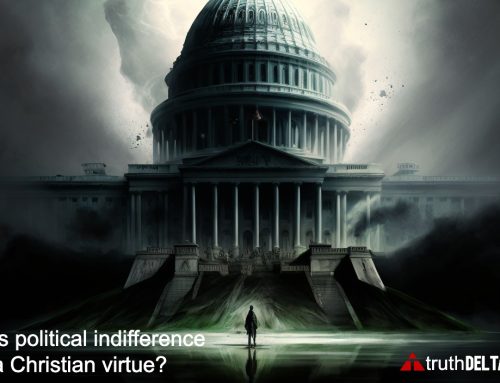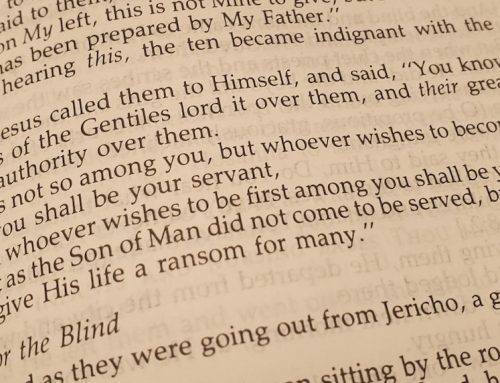Once a person sees inconsistencies between what Stanton teaches and what the Bible teaches, it can shake their faith to the core. The church has become an idol that stands in the place of God, so when the church is shown to be fallible, it can cause a chain reaction of questions and doubts about God. If God is not who Stanton says he is, can it be that there really isn’t a God at all?
I happen to believe there are very strong reasons to believe in God, despite the growing ridicule from the secular circles of society. Christians need not cower in fear of being challenged on matters of faith. They just need to wrestle with these questions themselves, and be willing and ready to give an answer to the skeptics.
I firmly believe in the truth of what Thomas Jefferson said: “Question with boldness even the existence of a God; because, if there be one, he must more approve of the homage of reason, than that of blind-folded fear.”
So does God exist? Let’s take a look at what is often called the moral argument for God. This formulation comes from an modern apologist and Christian philosopher I find particularly compelling named William Lane Craig.
The Moral Argument For God
- Premise 1: If objective moral values exist, then God exists.
- Premise 2: Objective moral values exist.
- Conclusion: Therefore, God exists.
I contend that no modern atheist philosopher has been able to poke holes in this argument.
Premise 1: If objective moral values exist, then God existsThe first premise is actually the easiest, because atheist ethicist will most often agree wholeheartedly with Premise 1, at least until challenged with some thought experiments. They might word it in a negative formulation, like this: “There is, in fact, no God, therefore, objective moral values don’t exist. They are up to each society to work out.”
Atheist arguments for ethics are 100% relativistic, because that is all they can be. There has been no foundation offered for an objective morality by atheists, because they don’t believe morals are objective. Point conceded. That was easy.
Premise 2: Objective moral values do exist
I mean this in the same way that I say that the Brooklyn Bridge objectively exists.That doesn’t mean everyone agrees with that statement. There could be someone who has never seen it, and would prefer to deny the reality that the Brooklyn Bridge exists. Nevertheless, those of us who are rational can say objectively that it does.
Consider whether it was moral for Hitler to exterminate six million Jews even if his henchmen believed they were doing society a favor? Even the atheist will be hard pressed to say that wiping out six million men, women and children out of a sense of racial superiority would not be objectively immoral in all cultures and all times.
Is rape universally wrong–even on Andromeda, hypothetically? You see, the atheist who tries to find a philosophical basis for morals (that they are the evolutionary formulations of society, or that they are simply the result of some other relativistic social construct, or the evolutionary product of the desire for happiness), cannot answer this question in the affirmative. One doesn’t need an imagination to conceive of a society that considers the barter of women and girls for sexual slavery to be morally wonderful. We just need to look as far as ISIS. For them, raping a child makes them happy, and it is not morally wrong to them. Why should we have a problem with it? That’s their moral social framework, so why should we bother speaking out? To which I say, because it’s objectively evil. That’s why.
The question now has some bite to it. Is it universally, objectively, morally evil to imprison another human being and use them for sexual gratification? An honest atheist ethicist must still admit that there is no circumstance or social framework that would make these actions morally good. If we are to call these acts evil, we absolutely must admit there is some objective morality to base that on, because in the radical Islamist culture–if morals are relative–it’s not only OK, it’s sanctioned by Allah.
These thought experiments illustrate that in the absence of any fixed point of reference for morals, we are left with one option. There are, in fact, objective moral values. And so for the reasonable thinker, the second premise is established.
- William Lane Craig’s podcasts: Defenders Series (start at the bottom of the list and work your way up through roughly 15 minute episodes)
- Debate with William Lane Craig vs. Sam Harris (2 hours)
- Clip from debate between William Lane Craig vs. Sam Harris (2 minutes)
I’ll leave you with a little poem I wrote called Does Evil Exist?






I have a hard time with this argument. I can see your point in this, but if there is a god, why does he allow children to be molested and raped? Or women to be held as sex slaves? Or even children to be born to horrific parents that should never have the privilege of being a parent? What these people go through is unimaginable to me, and how would they have any chance of having faith in god after enduring such things? Also, who is to say whose good is right? Do the most honorable Buddhists go to hell… Read more »
Hi Tanna, I appreciate your honesty. The question of evil is a difficult question. Not impossible, but difficult. 🙂 Let me first point out that it's different than the question of whether objective moral values prove the presence of a higher power, though. This question is about whether God is loving and all powerful since he fails to stop evil from happening. The fact that there is a concept called evil proves to me that there is a God whose ideals are intended to guide humanity. Call them what you will–love, compassion, justice–where do these ideals come from, if not… Read more »
I also want to clarify that I don't at all believe that only theists can do good or be moral. I believe God is the definition of love, yet I wouldn't say atheists can't love their spouse or child, etc. I am only making the point that objective moral values comes from God, not that someone who doesn't believe in God can't accept or live by those moral values.
I had a laptop stolen recently while traveling out of state. The criminal who smashed the window on my car caused several hundred dollars in damage, stole a laptop I bought for several thousand dollars (although it is worth much less now), and forced me to consume half a day of my time dealing with the aftermath of his or her selfishness. My question for those who doubt God's existence is this: Why was it wrong for him to take what he wanted? I contend that if there's no God, there is no good and evil, whether the evil we're… Read more »
And incidentally, this goes for those calling this cult evil. I believe that some of the things they do or have done are in fact wrong, maybe even evil. But if you don't believe in a transcendent God who created us and has a morally good nature to measure good and evil against, we have no basis for saying the child rapist or the thief is wrong. Am I right?
A lot of people moral compass is based on what THEY believe is right and what they can get away with. Without having to say, our moral compass is the bible.
Romans 5:13 For until the law sin was in the world: but sin is not imputed when there is no law.